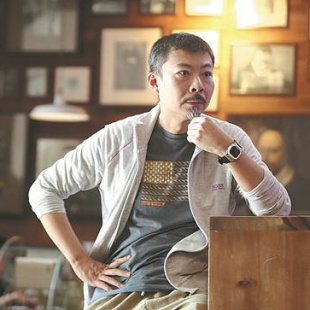One man's game plan to win over theater audiences


In the story, the reigning world chess champion Mirko Czentovic is traveling to Buenos Aires on an ocean liner. He amuses himself by allowing amateurs on board to challenge him in the game, before beating each of them and taking their money. There is only one passenger, Dr B, with an equal passion for chess. What price will he pay?
A moving portrait of one man's madness, Chess Story is the final work of Austrian novelist and playwright Stefan Zweig. It was sent to his US publisher only days before his suicide in 1942.
When Chinese actor, director and scriptwriter Guo Xiao read the novella for the first time over a decade ago, he was captivated. He dreamed of turning it into a Chinese play one day. On the 80th anniversary of Zweig's death this year, Guo realized that dream.
Celebrating 30 years of his career as an actor, Guo adapted the novella into a one-man play, also titled Chess Story, which premiered at the Drum Tower West Theater in downtown Beijing on July 15.
In July and August, Guo gave 20 performances, tickets for which sold out fast. After a short break, he will stage two more shows at the theater in late September, as part of the Lao She Theater Festival. Since its launch in 2017, the annual festival-named after renowned Chinese writer Lao She (1899-1966)-celebrates the remarkable bond between literature and theater.
"Zweig's novella has been my spiritual guide for a decade. To pay tribute to the master novelist, I wanted to ensure that his work reached a bigger audience. I shared my idea about a Chinese play adaptation with family and friends, and they all supported it," Guo says.
"Every time I read the novella, I had this gripping desire of turning it into a one-man play. Being the scriptwriter, the director and the actor is challenging, but I somehow knew I could do it."
Also known as The Royal Game in some translations, Zweig's final work looks at Nazism with characteristic emphasis on psychology.
Under the surface of their competition, the arrogant Czentovic and the mysterious Dr B represent different worlds. The former is solely drawn to money and power and the latter represents the power of intelligence.
Guo has taken the liberty of making some changes to the original story for the local audiences. In his play, Western chess has been replaced by a game of Chinese chess, which people here are more familiar with. He has a piano with him onstage, which he uses occasionally to mix high suspense with poignant reflection. He communicates with his audiences like a storyteller.
A highlight of Guo's play is the riveting display of guankou, the skill of delivering a long set of lines practically in one breath. It is one of the most recognized techniques of Chinese folk artists, including cross-talk performers and pingshu storytellers.
"A one-man play is often intimate, forthright and engaging. The performer usually concentrates on interacting with the audience, keeping them engaged throughout," says Guo. "It presents an enormous challenge for the performer, who is multitasking and using a mix of skills, such as narration, physical expression, dialogue and even stand-up comedy."
Guo's Chess Story is among three one-person plays that premiered at the Drum Tower West to celebrate the theater's eighth birthday this year.



































